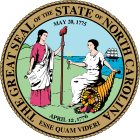North Carolina Council of State facts for kids

|
|
| Council overview | |
|---|---|
| Formed | November 12, 1776 |
| Jurisdiction | Government of North Carolina |
| Headquarters | Raleigh, North Carolina |
The North Carolina Council of State is a group of important leaders in the Government of North Carolina. These leaders are chosen by the people of North Carolina. They help run the state government.
Currently, the Council of State includes ten elected officials. These are the Governor, Lieutenant Governor, Secretary of State, Auditor, Treasurer, Superintendent of Public Instruction, Attorney General, Commissioner of Agriculture, Commissioner of Labor, and Commissioner of Insurance.
The Council meets regularly, led by the Governor. They share ideas and make big decisions for the state. For example, they vote on selling state property or borrowing money for North Carolina.
When North Carolina first wrote its rules (the Constitution) in 1776, the state's lawmakers (the North Carolina General Assembly) chose these leaders. In 1868, the rules changed. The Council of State then included the Secretary of State, State Treasurer, State Auditor, and Superintendent of Public Instruction. More elected officials have joined the Council since then.
The Council of State is different from the North Carolina Cabinet. The Governor chooses the Cabinet members. Even though they are different, people sometimes mistakenly call Council of State members "cabinet members."
Contents
History of the Council of State
North Carolina has a special way of sharing power in its government. The name "Council of State" comes from a long time ago, during the colonial era. Back then, there was a council that was part of the state's law-making group.
During the American Revolution, there was also a Council of State. This group was chosen by the lawmakers and helped limit the Governor's power.
How the Council Changed Over Time
The North Carolina Constitution of 1776 said that lawmakers would choose seven people for a Council of State each year. Their job was to advise the Governor.
In 1868, a new Constitution was made. The Council kept its name and some duties. But instead of being chosen by lawmakers, its members became elected officials. They served on the Council because of their other jobs. At first, only a few officials were on the Council. These included the Secretary of State, State Auditor, State Treasurer, and Superintendent of Public Instruction.
The state's current Constitution, from 1971, says that all officials listed in Article III of the document are part of the Council of State.
Who Serves on the Council
Here are the current members of the Council of State. You can also see when each office was created and who the first person to hold that job was.
| Office | Incumbent | Party | Office established |
First officeholder | |
|---|---|---|---|---|---|
| Governor | Roy Cooper | Democratic | 1776 | Richard Caswell | |
| Lieutenant Governor | Mark Robinson | Republican | 1868 | Tod Robinson Caldwell | |
| Secretary of State | Elaine Marshall | Democratic | 1776 | James Glasgow | |
| Auditor | Beth Wood | Democratic | 1863 | Samuel F. Phillips | |
| Treasurer | Dale Folwell | Republican | 1776 | John Baptista Ashe | |
| Superintendent of Public Instruction | Catherine Truitt | Republican | 1853 | Calvin H. Wiley | |
| Attorney General | Josh Stein | Democratic | 1776 | Waightstill Avery | |
| Commissioner of Agriculture | Steve Troxler | Republican | 1877 | Leonidas L. Polk | |
| Commissioner of Labor | Josh Dobson | Republican | 1887 | Wesley N. Jones | |
| Commissioner of Insurance | Mike Causey | Republican | 1899 | James R. Young | |
The First Council Members
In 1776, the Constitution said that the General Assembly would choose several officials:
- The Governor, who served for one year.
- The Secretary of State, chosen every three years.
- The Attorney General, who kept the job as long as they did well.
- The Treasurer, who served for one year.
- Seven people to be Councilors of State, serving for one year.
The Council of State at this time only included these seven chosen councilors.
In 1835, the Constitution changed. It said that voters would now choose the Governor, who would serve for two years.
Then, in the 1868 Constitution, the executive branch was defined. It included the Governor, Lieutenant Governor, Secretary of State, Auditor, Treasurer, Superintendent of Public Works, Superintendent of Public Instruction, and Attorney General. All of these were to be elected by the state's voters for four-year terms. The old, separate Council of State was removed. Instead, the Secretary of State, Auditor, Treasurer, Superintendent of Public Works, and Superintendent of Public Instruction became members of the Council because of their jobs. They would advise the Governor.
The General Assembly of 1777 elected the very first Councilors of State on April 18, 1777. They were:
- William Cray from Onslow County
- William Haywood from Edgecombe County
- Joseph Leech from Craven County
- Edward Starkey from Onslow County
- Thomas Eaton from Bute County
- Cornelius Harnett from New Hanover County
- William Taylor from Duplin County
 | Sharif Bey |
 | Hale Woodruff |
 | Richmond Barthé |
 | Purvis Young |

